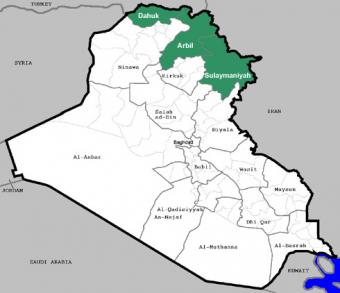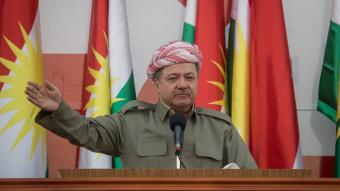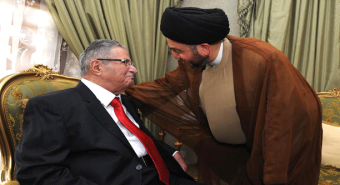Killing Kurdish Dream
Hubris and Parochialism Killed the Kurdish Dream

The Price of Hubris
The victory of the peshmurga over ISIS in the Nineveh, Kirkuk, Salah ad Din and Diyala governorates proved to be a Pyrrhic Victory and fostered complacency within the Kurdistan Regional Government’s (KRG) ruling factions, which thought international patronage and goodwill would carry them to independence. September’s referendum, used as a bid to claim oil-rich Kirkuk, was an act of extraordinary hubris and self-delusion by KRG President and Kurdistan Democratic Party (KDP) Massoud Barzani.
The rapid retreat of Peshmurga under the control of the Patriotic Union of Kurdistan (PUK) – KDP’s traditional rivals in the KRG - from oil-rich Kirkuk demonstrated the true limits of Kurdish aspirations. The intervention followed an apparently coerced agreement between the PUK and the Iranian overlord Qasem Suleimani, head of Iran’s Islamic Revolutionary Guard Corps’ (IRGC) Qods Force, who has come to dominate Iraq. The US abandoned their allies to their fate in the face of a bigger, bolder and better-organized power than ISIS’s crumbling forces.
 The KRG now finds itself encircled by hostile forces and Kurdish hopes of independence as a reward for their role in defeating ISIS lie dashed. Hezbollah executive council deputy head Sheikh Nabil Qaouk has called the routing of Kurdish Peshmerga forces in Kirkuk as ‘a victory over the US and Israel and an answer to Trump’s threats to Iran.’
The KRG now finds itself encircled by hostile forces and Kurdish hopes of independence as a reward for their role in defeating ISIS lie dashed. Hezbollah executive council deputy head Sheikh Nabil Qaouk has called the routing of Kurdish Peshmerga forces in Kirkuk as ‘a victory over the US and Israel and an answer to Trump’s threats to Iran.’The Kurds are the next victim of the IRGC’s plan to consolidate the ‘Shia Crescent’, a huge zone of control from the Gulf of Aden through Persian Gulf to the Mediterranean. But Kurdish indulgence in geopolitical intrigue in their singular desire for independence has left them weak, divided and alone.
Kurdish Parochialism and Iraq’s Failed State
Strategic geopolitical gaming, aligning with rival powers and playing them against each other, was destined for failure. Having opted out of a project of post-Saddam country-building in favor of their internecine regional power struggles, Kurdish leaders were the architects of the tragedy that now faces their people.
Kurdish nationalist leaders were complicit in the US-Iranian project of divide and rule, which portrayed Iraq as three separate and homogeneous communities. The post-Saddam constitution was largely forged by the Shia United Iraqi Alliance and the Kurdish parties, with Sunni representation largely side-lined. Iraq’s rich tapestry of religious and ethnic groups, also including Mandaean, Christian, Turkmen, Assyrian, and others, was also dismissed under this new divisive order that transformed Iraq into a failed state.  Kurdish leaders tolerated Prime Minister Nouri al-Maliki’s centralizing, dictatorial and chauvinistic tendencies so long as he did not threaten their parochial interests in the Kurdistan Regional Government (KRG) region.
Kurdish leaders tolerated Prime Minister Nouri al-Maliki’s centralizing, dictatorial and chauvinistic tendencies so long as he did not threaten their parochial interests in the Kurdistan Regional Government (KRG) region.
The foreign conspiracies that manipulate the rivalries of the dominant factions – the Iranian-backed PUK and the Turkish and Israeli backed Kurdistan Democratic Party (KDP) of KRG President Massoud Barzani – have also ensured that the KRG has been unable to forge coherent institutions and a civil society beyond the confines of the warring duopoly.
The marginalization of the Sunnis in the Kurdish-Shia bargain sowed the seeds for ISIS’s rise and removed the one force that could prevent takfiri jihadism. The Sunni tribes were instrumental in defeating Abu Musab al-Zarqawi’s Al-Qaeda in Iraq (AQI) in the 2006 Awakening movement of the ‘Sons of Iraq’ tribal militias. The Awakening had come with the promise that if Al-Qaeda was vanquished, the Sunnis would be safe and the militants would be reintegrated with the Iraqi Army.
AQI’s successor, ISIS, would not have come to prominence if Prime Minister Maliki had not betrayed the Awakening movement and reverted to Shia sectarianism and demagoguery, while Kurdish leaders looked on indifferently, even approvingly.
One person had the power to halt the repression of the Arab Sunnis: President Jalal Talabani, the legendary PUK guerrilla leader. But he appeared more concerned with his party’s power base, shored up by decades of Iranian support and his Faustian Pact with Soleimani. Adopting the comfortable position of a ceremonial figurehead, Talabani turned a blind eye to the atrocities that would push the Sons of Iraq into the clutches of ISIS.
Maliki's subsequent actions confirmed in the minds of many embattled Sunni sheikhs that, at the very least, they needed allies to resist the Baghdad government. But the Kurds were simply not paying heed to Iraq’s descent into chaos.
Talabani refused to stop Maliki from taking revenge against the secular, non-sectarian Iraqiya List, led by Ayad Allawi, a Shia ex-Baathist, which with Sunni Arab backing in Anbar and Ninevah had defeated which defeated the Shia coalition in the 2010 elections. In 2012, he muttered merely his ‘surprise’ and ‘regret’ over the warrant for the arrest of his Sunni vice-president Tariq Hashimi – the leader of Iraqi front of the Muslim Brotherhood – on charges of terrorism and the subsequent death sentence after a trial in absentia.
Non-violent protests by Sunnis, supported by secular Shia leaders, were met with brutal aggression by security forces and the Iranian-backed Hezbollah death squad, the Mukhtar Army. Meanwhile, Kurdish leaders were distracted with their fussing over the Erbil Accords on Kurdish autonomy and Talabani was incapacitated by ill-health.
With Sunnis lacking any electoral means to express their grievance and no opportunity to protest in their streets, Anbar’s sheikhs felt they had no option but to pledge allegiance to ISIS. They cited their reasons as broken promises by the Baghdad government, the deployment of Shiite militiamen in Sunni areas and the collective punishment of the Sunni population. The eventual defeat of ISIS in Mosul was not a victory for the Iraqi nation, but a military triumph for Iran and its Shia militias at the expense of the Sunnis and Kurds.
Saving the Kurds from oblivion:
With US President Donald Trump turning his back of the Kurds in their hour of need, the KRG now faces an existential threat from the array of forces waged against it. The IRGC, Hezbollah, Hashd al-Shaabi militias and the Iraqi Army have not stopped at routing the Peshmurga from the disputed Kurdish areas. They are advancing on Erbil to neuter or dissolve the KRG. The Kurds are getting the treatment meted out to the Sunnis in Anbar and could potentially lead to the kind of genocide reminiscent of the Saddam era.
Genuine sovereignty requires unity in diversity and the collectivization of forces against foreign intervention, whether Iranian, Turkish, American or Israeli. As the Kurds cannot rely on outside allies, they may find common cause with domestic allies.
Only by playing a full role in the development of Iraq and building a civil society, rather than a separatist project pursued by an increasingly discredited Kurdish leadership, can Kurds achieve permanent peace and freedom. This need not mean giving up on their autonomy, but it would mean recognizing their limitations following October’s dose of reality.
